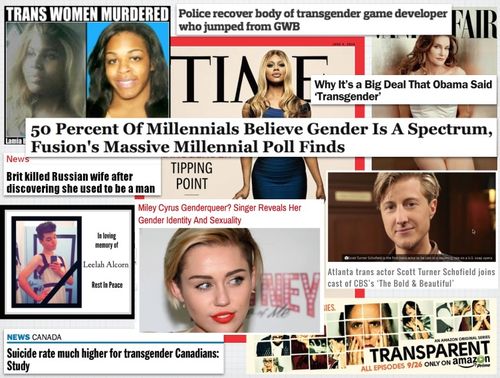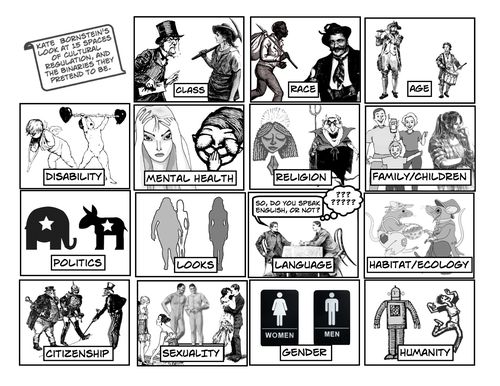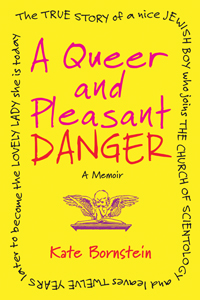First, here's a video (shot by audience member, Jim Fouratt) of Barbara Carrellas presenting & Kate Bornstein accepting the 2014 Lambda Literary Award. The text of both their remarks follows.
Barbara Carrellas Remarks,
Presenting Lambda Literary Pioneer Award to Kate Bornstein
Imagine with me, please. Imagine a place that is not here and a time that is before now. Imagine a gathering of ancient bodiless souls, all drinking tea and deciding the social priorities for the 20th Century. One gay soul suddenly turns serious. “I am calling for us as a soul group to congregate in the United States in the mid-20th century. Our time on earth will be short. Almost all of us will have died of a plague they will call AIDS before the millennium. Our task? To love and care and fight for each other so fiercely, to become so strong and so visible, that gay men and lesbians in a large portion of the world will have equal rights shortly after our deaths.
There are gasps of awe and enthusiastic shouts of agreement. “Count me in! Me, too! Me, three!” When the cacophony dies down, one lone, lovely creature speaks “That is wonderful but, it’s not enough. What about everyone who doesn’t fit into the binary of gay or lesbian? Or man or woman? What about every sexual outlaw and freak of gender? Who’s gonna fight for their rights?”
The thoughtful soul who had proposed AIDS to the group, says, “You’re right. But I don’t see how we can do it all in one go.” “Ah, but I do,” says the lovely one. “I’ll go down with you, but I’ll take another path while you take on AIDS. By the time you’ve finished, I’ll be ready. I need the time, anyway. I have research to do. I’ve been thinking that most of earth’s problems are caused by gender. Gender on earth operates like a evil cult. I need time to explore the nature of cults. I heard yesterday that someone is creating a new cult. I think they are calling it Scientology. I think I’ll check it out.”
The lovely loner was not alone for long. Many in the AIDS soul group were so taken with the Gender Project that they volunteered to jump back into new bodies right after their AIDS lifetimes. “Wait for us! We’ll be back to join you. You’ll recognize us. We’ll be the cute ones with great haircuts, unrecognizable gender presentations, and creative pronouns. But we’ll need to be caught up to speed quickly. Write us some books we can read while we’re growing up. Books that will help us keep ourselves safe and prepare us to fight for the new gender revolution.”
And thus it was decided.
Albert Bornstein was born in 1948. He joined the Church of Scientology in 1970, and learned cults from the inside for 12 years. In 1986, Kate Bornstein was born.
If you ask the question, as I recently did on Facebook and Twitter, “What does Kate Bornstein mean to you?” the overwhelmingly most popular answer is, “Kate Bornstein saved my life.”
As writers, we have all collectively and individually inspired lots of people. We’ve changed more than a few lives with the power of our words. But how many of us can say that our writing has saved thousands of lives?
It is my fiercest pleasure to present the Lambda Literary Foundation’s Pioneer Award to my beloved partner in life, love and art, Kate Bornstein.
*****
Kate Bornstein Pioneer Award Remarks, Lambda Literary 2014
Thank you Lambda Literary, for this wonderful moment of recognition. You are perfect dears to be doing this for me.
OK—thank you to so many of you in this room. Last year—and again just over a month ago—over 3,000 people around the world joined together to raise more than $120,000 to help me get through cancer therapy, when I was too sick with side effects or recovering from surgeries, to go out on tour and earn my daily bread. What’s more—something I never thought would happen, but your gifts and well wishes completely crushed, once and for all, my low sense of self-esteem. You saved my life. You made me wanna stay alive. Bless your hearts.
Alright now-pioneering. Only a very few people do that solo. I sure didn’t. In the areas of gender identity and expression, I have many colleagues to thank—as well as writers I’ve followed, imitated, and stolen from. Their names will appear on my blog, but I do need to speak some names here, tonight.
My path as a writer of books has been guided by remarkable publishing houses and editors:
- Serpent Tail Press, Amy Scholder & Ira Sliverberg —
- Routledge Press, Bill Germano —
- Seven Stories Press, Crystal Yackaki & Amy Scholder —
- T Cooper for Akashic Books, —
- Tristan Taormino for Cleis Press,—
- Seal Press, Brooke Warner —
- Beacon Press, Gayatri Patnaik—
- and Routledge Press again, Erica Wetter.
- Love and thanks Caitlin Sullivan, co-author of Nearly Roadkill.
- Love and thanks to S. Bear Bergman, outstanding co-editor of Lammy award winning Gender Outlaws the Next Generation.
- Thanks to my tour agent, Jean Caiani at SpeakOut.
- Thank you Gail Leondar-Wright, for the publicity that first ever got Gender Outlaw out into the world.
- I’m forever grateful to my literary agent—I love you, Malaga Baldi.
- My friend and mentor for over 40 years is John Emigh—he’s always pushed me into writing what’s most scary to write about.
Finally, the editor who has been looking at all my words for 17 years now is my bubu, my muse, and my dear imzadi, Barbara Carrellas. When we were both souls outside of time and space, and we were deciding our rebirths: what could we do to ease the suffering of queer people? Well, it was Barbara who decided to make it her life’s mission to pioneer ecstatic sex that wouldn’t spread the plague. Thank you, bubu. You’ve brought ecstasy into my life and into the lives of all my kids—and you’ve always been there as an emergency power source all those times when I was nearly a goner. Love you, Miss Barbara.
*******
We live in interesting times. For the first time since anything trans has come to public awareness on this planet, the face of transgender belongs to a woman of color, Laverne Cox. The literary face of trans belongs to a woman of color, Janet Mock. And the pop culture face of trans belongs to a tranny of color, RuPaul.
Interesting times, indeed. For the first time ever, there are three generations of sex-and-gender theorists, artists, and activists, all alive at the same time—each generation has its unique point of view, each with unique experiences and timeline.
I’m asking that we three generations of sex and gender artists, activists, theorists, and spiritual leaders come together in a pioneer coalition that deals with race and class within our community—for starters. I want we three generations of LGBTQetc to welcome family living beyond those letters, for we are legion.
Our legion of identities has the common denominators of sexuality, sex, gender identity, and gender expression. But because we live in a culture founded by Puritans, it’s shameful to talk about sex and gender. Nevertheless, all of us are here tonight because of terrific sex and/or fabulous gender. Now, Puritanical sex-negativity shames us into invisibilizing our terrific sex and our fabulous genders. And sadly, institutionalized sex-negativity extends into our own community. We shame each other. We’re being mean to each other. We have got to stop shaming, and distancing ourselves from sissies, sex workers, BDSMers, pornographers, sluts, burlesque artists, trannies and drag queens. These are the funnest people in our family—shaming these people and distancing ourselves from them is mean. It’s a Puritanically-generated mix of misogyny, homophobia, and transphobia. I’m asking you as your old Auntie: please stop doing that. Someone, pioneer a queer community that doesn't eat its own… please.
In this spirit of inclusivity, Dear Lambda Literary people, may I be so bold as to tickle your own fabulous pioneering spirit? Please, Lambda Lit, create award categories for sex education, queer Young Adult fiction, queer spirituality, and one more category for books written by people with sex and gender identities not yet expressed by LGBT.
OK, I’m wrapping up now. Here’s the deal: I’ve got lung cancer and leukemia. I know, I know I might be around for another 15 or 20 years, but just in case I’m not, I wanna say this now: Please, my darlings, all of you, take care of each other. Watch each other’s back. Stand up for each other. Please.
Now, go sissy your walk, children. Please, stay alive. Have good sex, have fun with gender, and write great stuff about that.
Auntie loves you.
Kiss Kiss




